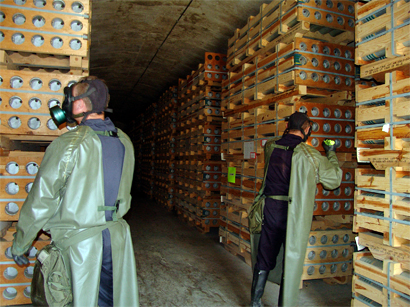The Organization for the Prohibition of Chemical Weapons approved a plan Friday for destroying Syrian chemical weapons outside the country, but it was unclear where the plan can be carried out after Albania refused to host the demolition, dpa reported.
The OPCW's 41-member executive body in The Hague approved a plan that would see the most dangerous chemical weapons, including mustard gas and sarin, removed from Syria by the end of the year.
Albania earlier rejected a US request to destroy Syria's chemical weapons arsenal, with Prime Minister Edi Rama saying that his country was not in a position to do so. The refusal was a setback for international efforts aimed at ensuring the destruction of Syria's stockpile.
In a nationally televised address, Rama said that Albania had, in principle, initially responded favourably to the request from the United States. But Albania had neither the technology to destroy chemical weapons nor facilities for their transportation, he said.
Sigrid Kaag of the Netherlands, who is leading the joint United Nations-OPCW mission, said her team in Syria was working in extreme security situations in an active war zone, noting the risks to their safety.
Since early October, when the United Nations and the OPCW started their chemical disarmament operation in the war-torn country, 22 of a total 23 chemical weapons sites declared by Syria have been verified.
All facilities for producing such arms and for filling chemicals into munitions have been destroyed, according to the OPCW.
The Hague-based watchdog announced on October 31 that Syria had destroyed all its declared equipment for the production of chemical weapons ahead of a November 1 deadline.
The destruction of the equipment was the first step toward eliminating Syria's arsenal of banned weapons by mid-2014, under a September UN Security Council resolution backed by the US and Russia.
The OPCW last month was awarded the 2013 Nobel Peace Prize, with the Norwegian Nobel Committee citing the organization's "extensive efforts to eliminate chemical weapons."
More than 100,000 people have been killed in Syria since March 2011, the UN estimates, when peaceful protests against President Bashar al-Assad's regime were repressed by force and quickly descended into civil war.






